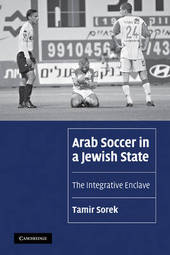
|
Arab Soccer in a Jewish State: The Integrative Enclave
Paperback / softback
Main Details
| Title |
Arab Soccer in a Jewish State: The Integrative Enclave
|
| Authors and Contributors |
By (author) Tamir Sorek
|
| Series | Cambridge Cultural Social Studies |
|---|
| Physical Properties |
| Format:Paperback / softback | | Pages:244 | | Dimensions(mm): Height 229,Width 152 |
|
| ISBN/Barcode |
9780521131353
|
| Classifications | Dewey:306.483 |
|---|
| Audience | | Postgraduate, Research & Scholarly | |
|---|
| Illustrations |
Worked examples or Exercises
|
|
Publishing Details |
| Publisher |
Cambridge University Press
|
| Imprint |
Cambridge University Press
|
| Publication Date |
11 February 2010 |
| Publication Country |
United Kingdom
|
Description
Over the last two decades soccer has become a major institution within the popular culture of the Arab-Palestinian citizens of Israel. They have attained disproportionate success in this field. Given their marginalisation from many areas of Israeli society as well as the ongoing Israeli-Palestinian conflict, such a prominent Arab presence highlights the tension between their Israeli citizenship and their belonging to the Palestinian people. Bringing together sociological, anthropological and historical approaches, Sorek examines how soccer can potentially be utilised by ethnic and national minorities as a field of social protest, a stage for demonstrating distinctive identity, or as a channel for social and political integration. Relying on a rich combination of quantitative and qualitative methods, he argues that equality in the soccer sphere legitimises contemporary inequality between Jews and Arabs in Israel and pursues wider arguments about the role of sport in ethno-national conflicts. Ideal for researchers and graduate students.
Author Biography
Tamir Sorek earned his PhD in sociology and anthropology at the Hebrew University of Jerusalem in 2002 and taught for three years at Cornell University. Today he is an Assistant Professor of Sociology and Israel Studies at the University of Florida. His interest and publications centre on Israeli and Palestinian identities as well as Israeli-Palestinian relations. His study of these relations focuses on socio-historical dynamics, power relations, and the juncture of culture and politics. In his studies, Sorek combines both quantitative and qualitative methodologies. His current project, supported by a Fulbright fellowship, deals with the ways Israeli and Palestinian national memories dialogue and confront one another.
ReviewsReview of the hardback: 'This is a surprising story of the only sphere in which Arab-Israeli relations do not seem to be in crisis. Sorek has written a subtle and apparently non-partisan account of the place of Arabs in the Jewish state. Thanks to its refreshingly clear prose, this book should have an appeal beyond specialists in the field.' Simon Kuper, author of Football Against the Enemy Review of the hardback: 'Sorek demonstrates considerable skill in capturing the complexity of the topic and drawing together the intricate social and political context.' British Journal of Sociology Review of the hardback: '... acute and poignant survey of Arab football in Israel.' The Times Literary Supplement Review of the hardback: 'The precarious, unequal place of the Palestinian in Israel, and in Israeli football ('soccer') more specifically, is the subject of Tamir Sorek's sociological tract, Arab Soccer in a Jewish State: The Integrative Enclave. Mapping loosely, the history of Arab Palestinian 'disenfranchisement' ... Arab Soccer endeavours to understand the place of football within Israel's Arab community ...[the book] is adept, even illuminating, at explicating how football functions for the Arab minority in Israel.' Journal of Palestine Studies Review of the hardback: 'The book's nine chapters provide fascinating accounts of how soccer is inextricably linked to Israel's broader social, cultural and political conflicts. Sorek explicitly discusses these relationships often starting or ending chapters with events that run concurrently in Israeli politics and Israeli soccer. His writing refuses to shy away from how sport and politics merge and the accounts provide students and academics with vivid past and present examples of the imbrications.' Managing Leisure
|